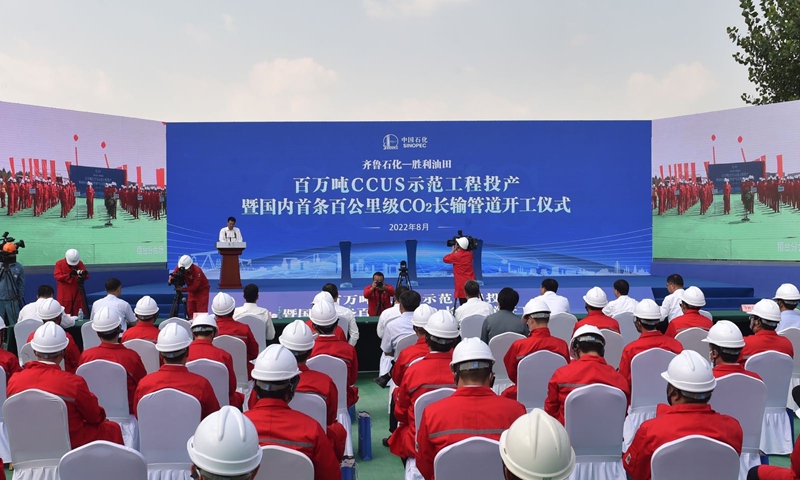
Photo: Screenshot from website
China’s largest carbon capture, utilization and storage (CCUS) project was put into operation on Monday, marking a key step to facilitate China’s goal of carbon peaking and becoming carbon neutral, according to Sinopec, which is operating the project.
It is expected that the project can cut annual carbon dioxide emissions by 1 million tons, which is equal to planting nearly 9 million trees, Sinopec said.
CCUS is an important emissions reduction technology that can be applied across the energy system. It refers to a suite of technologies for the capture of CO2 from power generation or industrial facilities that use either fossil fuels or biomass for fuel. The captured CO2 is stored and can be used for industrial purposes. Potential uses including being sold to oil companies for enhanced oil recovery (EOR), or as a feedstock for the production of synthetic fuels, chemicals and building materials.
In Sinopec’s CCUS project, the Sinopec Qilu Petrochemical Company will capture the CO2 and transport it to Sinopec Shengli Oilfield for enhanced oil recovery. The project is expected to inject more than 10 million tons of CO2 and add nearly 3 million tons of oil in 15 years, according to Sinopec.
CCUS is an important technology to achieve large-scale greenhouse gas emission reduction and is suited to China’s energy structure, Lin Boqiang, director of the China Center for Energy Economics Research at Xiamen University, told the Global Times on Monday.
“The development of CCUS can promote the efficient utilization of fossil fuel energy and accelerate the transformation of traditional high-emission industries, which is of great significance for China to achieve its carbon goal,” Lin said.
With the nation’s efforts to promote green transformation and R&D support, China is narrowing the gap with the West where the technology originated, Lin said.
According to the China CCUS Annual Report (2021), about 40 CCUS demonstration projects have been put into operation or are under construction in 19 provinces in China, including capture projects for power plants and cement plants.
As China's decarbonization pace has grown, China's coal power, cement, steel and other industries are seeing huge demand for emission reduction, which is expected to drive CCUS into a period of rapid growth, experts said.
It is estimated that the CCUS emission reduction demand for various industries will reach 408 million tons in 2030 and 1.82 billion tons in 2060. China's CCUS market is expected to reach 330 billion yuan ($47.68 billion) by 2050, according to the report.




